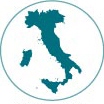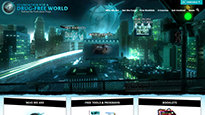When a 2005 analysis of Italy’s Po River showed that the waterway carried the equivalent of 4 kilos, or 8.8 pounds, of cocaine per day, the government launched a nationwide awareness campaign targeting young people.
Church of Scientology drug prevention programs were already at work in the country but were stepped up to meet the renewed urgency to cut drug usage.
With heroin use high in the 1980s and 90s, the Church had launched its first initiative, “Say No to Drugs.”
As part of the program, Scientologists organized syringe pick-up events in public parks and other heavy heroin-use areas—an activity that continues today. In
total, they have logged half a million hours removing massive quantities of dangerous needles.
MORE THAN
25
PERCENT
DECLINE
— in —
drug usage

across
THE
ENTIRE
NATION
Concurrently, volunteers conduct lectures in schools, hold drug awareness events and speak on television and radio to bring the drug-free message to a broad audience.
To increase the grass-roots impact of the program, Say No to Drugs teams have increased their distribution of Truth About Drugs booklets through partnerships with sports organizations. Volunteers have also distributed the educational materials in nightclubs, passing out booklets and playing the documentary on closed-circuit television. A dozen towns have officially adopted the campaign, and the drug education booklets have been printed in full in a national police magazine.
In one year, Italian volunteers reached 500,000 people through 300 events, handed out 250,000 booklets, and aired the PSAs and Truth About Drugs documentary to 16 million viewers.
Writing to the Church of Scientology volunteers, Senator Salvo Fleres acknowledged their role in contributing to a 25 percent decrease in drug abuse in the country through the Say No to Drugs campaign—“one of the most enduring and largest drug prevention initiatives in Italy.”
Thus, the director of the Department for Anti-Drug Policies of the Italian government might have been referring to the Truth About Drugs when he stated: “The alarms of the past years, particularly on cocaine, made us think that it was inevitable living with drugs. But the work of prevention activities, with all the rest, yielded benefits. And now we can say that drugs aren’t an invincible plague.”

































